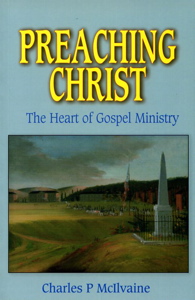 I recently finished Preaching Christ, by Charles P. McIlvaine, who was a pastor and eventually the chaplain at West Point, in addition to a variety of other accomplishments. This book was filled with quotable quotes from McIlvaine, who authored this initially as a charge delivered to the clergy of the Diocese of Ohio in June 1863.
I recently finished Preaching Christ, by Charles P. McIlvaine, who was a pastor and eventually the chaplain at West Point, in addition to a variety of other accomplishments. This book was filled with quotable quotes from McIlvaine, who authored this initially as a charge delivered to the clergy of the Diocese of Ohio in June 1863.
Though many nuggets of wisdom and truth abound in this small volume (just Search McIlvaine on this site and you will discover many quotes), I found it a dreadfully slow read and at times difficult to follow. However, it was not all bad. Take for instance the jewels that are the quotes below:
It is very possible to preach a great deal of important religious truth, and so that there shall be no admixture of imporant error in doctrine or precept–yea, truth having an important relation to Christ and his office–and yet not to preach Christ…Religious truths are not the gospel, except as, like John the Baptist, they point to the Lamb of God.
The best chapter in the book was actually not written by McIlvaine, but was the first sermon preached by C.H. Spurgeon at the Metropolitan Tabernacle included in this volume by the good people at Banner of Truth. As one considers the subject of Preaching Christ, there may not be a better teacher outside of Holy writ than Spurgeon himself, and in his first sermon at the Metropolitan Tabernacle, he lays a foundation and vision for the ministry of the building that will revolve solely in, on, and around the person of Jesus Christ. Spurgeon warns against doctrinal preaching that is neither experimental (experiential in our own day would probably be a better word) nor practical:
Must I not, if I preach Christ personally, preach his doctrines? I believe they are nothing but the natural outgrowht of that great root thought, or root substance rather, the person of the Lord Jesus Christ. He who will preach Christ fully will never be lax in doctrine…And what better experience can you preach than in preaching Christ…And what better practice can be preached than preaching Christ…He cannot fail, then, to be a good doctrinal, experimental, practical preacher who preaches Christ.
Spurgeon also takes a pot-shot at those of his day (and some in our own) who ride their particular doctrinal hobby horse to death while neglecting the whole counsel of God and specifically the crucified, dead, buried, and resurrected Lord who sits today at the right hand of the Father:
The only variety some ministers give, is one Sunday to have depravity, election, and perseverance and the next Sunday, election, perseverance, and depravity. There are many strings tot he harp of the gospel. Tehre are some brethren who are so rightly charmed with five strings, which certainly have very rich music in them, that they never meddle with any of the other strings; cobwebs hang on the rest while these five are pretty worn out.
We will do well to preach Christ and to remember that preaching Christ is not bound up in the preaching of the gospels. Christ is preached from Genesis to Revelation and, as Spurgeon once said, there is always a road in the Word that leads to Christ. It is the responsibility of the gospel preacher to always point men and women to Christ and him crucified.

